It's extremely
important that you know what to bring
and how to pack correctly when you
travel. You must learn to get by
with
only bringing what you absolutely need.
With few exceptions such as a small
travel umbrella, you should only pack
what you will absolutely need and not
what you think you might need.
|
Easy to walk, shop and lock |
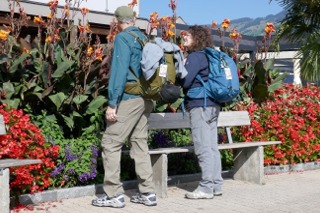 |
 |
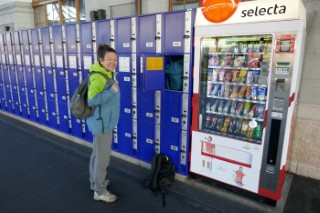 |
|
Spiez Switzerland |
Dijon France |
Thun Switzerland |
When we first
began traveling, we were typical
tourists. We brought a large suite case with us,
checking it in on our flight and pulling
it around everywhere we went.
We quickly learned that pulling a heavy bag over
cobblestone streets was not too friendly.
Our clothing was
typical of a novice traveler.
We wore and packed bulky and
heavy blue jeans and wore running shoes,
both of which took forever to dry when
they got wet; and they did get wet
one day, in fact soaked. On the
day we visited
the Neuschwanstein and
Hohenschwangau Castles in Fusson, it rained the
entire time. Fortunately we had
brought rain
jackets, but that did nothing to protect
our pants and shoes.
At the time, thinking to bring a small
travel umbrella on our trip was not even
on the radar.
Over the years with many travel
adventures now under our belt, we have
learned what to bring and how to pack;
getting it down to an art.
 |
 |
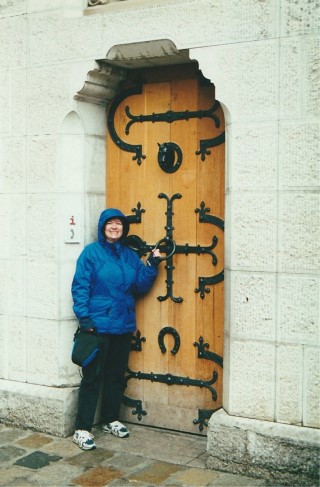 |
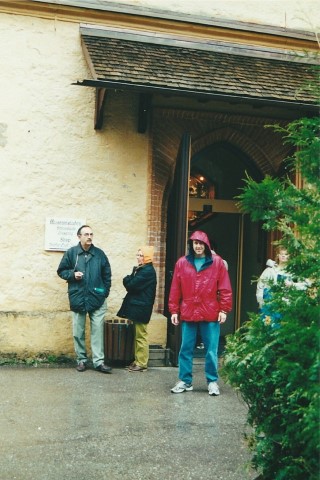 |
|
In the
Rain |
|
Neuschwanstein & Hohenschwangau
Castles - Fusson, Germany |
You need to learn
how to Travel Light with a single carry
on bag, even on a multi-week trip. Don't
think that it cannot be done. Once you know what to bring
and how to pack, you should easily be
able to fit everything you need into a
single bag that meets airline carry on
restrictions for size and weight.
I
remember years ago noticing a
couple boarding a train at some
station in Europe. As they
were rushing to catch their train,
they were each holding luggage in
their arms while pulling larger bags
on wheels with other bags strapped
to the top. They must have been
traveling with 6 or 7 large
and medium size bags.
As I watched them struggle getting on
the train lifting their heavy bags I
started thinking about what was
absolutely necessary to bring on a trip
and what was the best way to carry
everything around. This was
during my early years of travel when
I was experimenting with different
types and sizes of luggage.
At the time, I had a
hard sided suite case with a telescoping handle and
wheels that was small enough to fit in
an airlines overhead compartment and could also be worn as a
backpack. I never was happy
with this type of bag for several
reasons. I also felt like I was
walking around with a piece of
luggage strapped to my back - not cool!
Since we are
discussing packing, here is a photo
showing some of our boxes when we moved
from the US to England for a three year
stay. We were
packing up our life and moving our house contents was a
bit different than packing for a
vacation. For several years prior
to our move, we used to travel to
Europe from the US once or more a year.
Our trips were always self-planned with
the occasional group day trip excursion
if it made sense. We
learned a lot from all those trips, but living in England
gave us the opportunity
to travel easily and more often all around Europe
and other locations as well. We devoted our
stay in England to travel; exploring all
we possibly could during that time.
This opportunity came about as the
corporate offices of my company were
located in Langley England, just outside
of London where I was
offered a position as a
Product Manager for the international
markets of Europe, the Middle East and
Africa (EMEA).
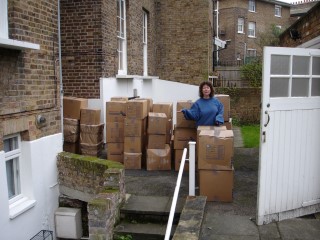 |
|
Moving into our
flat |
|
Unpacking -
Windsor, England |
With all our
trips, we were constantly trying to
simplify and improve the way we packed
and what we brought with us. We
were always looking for the perfect
backpack for travel having the right
sized main compartment with additional
side and top storage areas. We
learned to only bring the minimal amount we
required for the trip and how to pack it. If we found
we we were bringing things with us that
we did not use, we tried to eliminate
those items on future trips. You have to
ask yourself 'do I really need this?'.
Again, don't bring things you think you
may need, only bring things you know you
will need.
Think about
bringing Disposable Clothing.
These are articles of clothing you may
be planning to throw out eventually such
as underwear, sox, old shirt, etc.
The benefits are that you will be
getting rid of some of your older
clothing while at the same time making
room in your backpack as your travel
along discarding items. This
additional room can now be used for
items you may have purchase during your
travels.
 Don't wait until the last minute to
start packing. Practice packing
and organizing your pack days or even a week
ahead of time. You may actually spend
hours contemplating what to bring and
how to pack it. Think about what
you actually need and what you will
actually wear. How many pairs of
pants and underwear do you actually
need? How many shirts, sox, etc.
Organized you pack with the must bring
items such as rain gear, umbrella,
electrical plugs etc. How does it
all fit? What does you pack weigh?
Spend time working it all out, not just
in your head but by going through the
actual packing activity.
Don't wait until the last minute to
start packing. Practice packing
and organizing your pack days or even a week
ahead of time. You may actually spend
hours contemplating what to bring and
how to pack it. Think about what
you actually need and what you will
actually wear. How many pairs of
pants and underwear do you actually
need? How many shirts, sox, etc.
Organized you pack with the must bring
items such as rain gear, umbrella,
electrical plugs etc. How does it
all fit? What does you pack weigh?
Spend time working it all out, not just
in your head but by going through the
actual packing activity.
-
 Think about
bringing older disposable
clothing.
Think about
bringing older disposable
clothing.
-
 Don't bring things you think you
may need, only bring things you know you
will need.
Don't bring things you think you
may need, only bring things you know you
will need.
-
 Pack your backpack and wear it
around on a walk to be sure it
fits correctly, is comfortable
and not too heavy.
Pack your backpack and wear it
around on a walk to be sure it
fits correctly, is comfortable
and not too heavy.
-
 Consider
items you can leave behind and
purchase upon your arrival
such as toothpaste and other
personal items.
Consider
items you can leave behind and
purchase upon your arrival
such as toothpaste and other
personal items.
-
 Bring clothing that can easily
be interchanged allowing you to
wear different pants/shirts combinations.
Bring clothing that can easily
be interchanged allowing you to
wear different pants/shirts combinations.
Our
Travel
Skills Tips & Tricks pages are
full of ideas and examples showing you
what to
wear, purchase abroad and bring with you
on your travels.
 Be sure to
review and print our
Travel Packing Checklist helping to
ensure you have included everything you
need. Check off items as your
gather them together for your trip. Be sure to
review and print our
Travel Packing Checklist helping to
ensure you have included everything you
need. Check off items as your
gather them together for your trip.
|
Sample Backpack Contents |
|
The following
will give you an idea of what to
pack and how to pack
for a trip of several weeks.
What you pack will no doubt be
different, but in general, this
should give you a good idea.
To stress the point of all you may
be able to bring, we may have even
over packed here. We could
have easily eliminated an under shirt,
tank top and the separate hiking
shorts as we will be wearing and
bringing other pairs of convertible
cargo pants. We have also
included items for a cooler climate
including a heavier fleece jacket
that can be worn under the
primary/rain jacket, fleece gloves
and running tights for additional
warmth. We have been extremely
conservative here, using our 32
Liter Pack coming in at only 14
Pounds with everything you see here.
It was full, but well under the
typical
Airline Size & Weight Restrictions.
In fact, we still had room in the
top and side pockets as well as the
front pocked where we would place
our travel documents.
For a longer
trip of several weeks, a better
choice may be a larger pack up to
40 Liters, giving you additional room for items
acquired during your travels but still meeting
airline size and weight
requirements.
Looking at our packing photos below, we noticed that we did not include a couple of very important items, our travel
Umbrella and our
Travel Buddy! This shows the importance of using the
Travel Packing Checklist. |
|
|
 |
When you are traveling, you will more than likely be walking several miles every day. If you are not used to traveling with a backpack, or are using a new backpack, we recommend packing it just as you would for your actual trip and trying it out. Once packed, put it on and walk around for at least an hour. Hit the trails or wear it around town
window shopping to represent the travel experience more closely. By doing this, you will be sure you can handle the weight and time you may be wearing it.
|
|
|
Contents
- 1 Pair of
Convertible Cargo Pants
- Rain/Day
Pants
- Running
Tights
- Tank Top
- Sweatshirt
- Hiking
Shorts
- Extra Day
Pack
- Money Belt
- 3
Lightweight Hiking Style Shirts
- 2
Convertible Long Sleeve Shirts
- Travel
Binoculars
- Camera Case
- Backpack
Rain Cover
- Cable & Lock
- Notepad /
Pen
- Fleece
Gloves
- Underwear /
Sox
- Charger
Cable / USB Plug
- Universal
Plug Adaptor
- Camera
Tripod
- Glasses
- Clear Bag
with Toiletries
In photo
not packed
- Belt, Hat &
Jacket (will be
wearing)
- Fleece
Jacket (will be wearing or strapped
to pack exterior)
Additional
Remember, in addition to
everything you see here, you will also
have another complete set of clothing including
pants, shirt, etc. - the ones you will
be wearing.
|
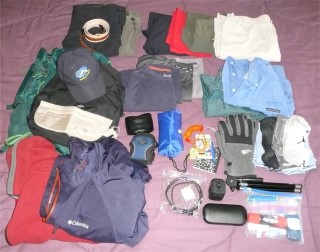
 Rolling your
clothing will
help reduce creases and wrinkles and
compress them giving you more valuable
room in your backpack. Rolling your
clothing will
help reduce creases and wrinkles and
compress them giving you more valuable
room in your backpack.
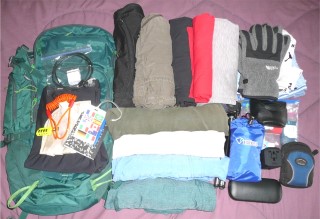
 Pack heavier items and things you won't immediately need at the bottom of your pack such as pants, shirts, underwear etc. Pack heavier items and things you won't immediately need at the bottom of your pack such as pants, shirts, underwear etc.
 Pack items you may need access to at the top of your backpack or in a separate compartment for quick and easy access. This may include item such as your umbrella and rain gear. Pack items you may need access to at the top of your backpack or in a separate compartment for quick and easy access. This may include item such as your umbrella and rain gear. |
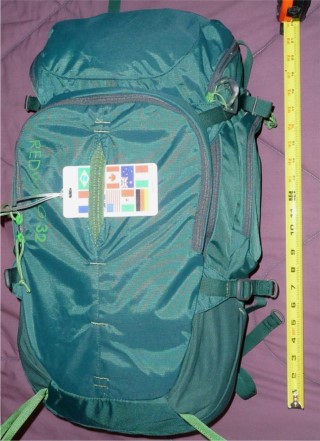
Fully Packed
Size: 32 Liter
22 in. L x 12 in.
W x 8 in. H
Weight: 14 Pounds
This 32 Liter
Pack is well within the limits of the
Airline Size & Weight Restrictions.
This pack is actually a bit small for an extended trip. Since then, we have changed to a larger 40 Liter Pack that still meets airline carry on size restrictions. See our page: Backpacks for Longer Trips |
|
|
|
|
|